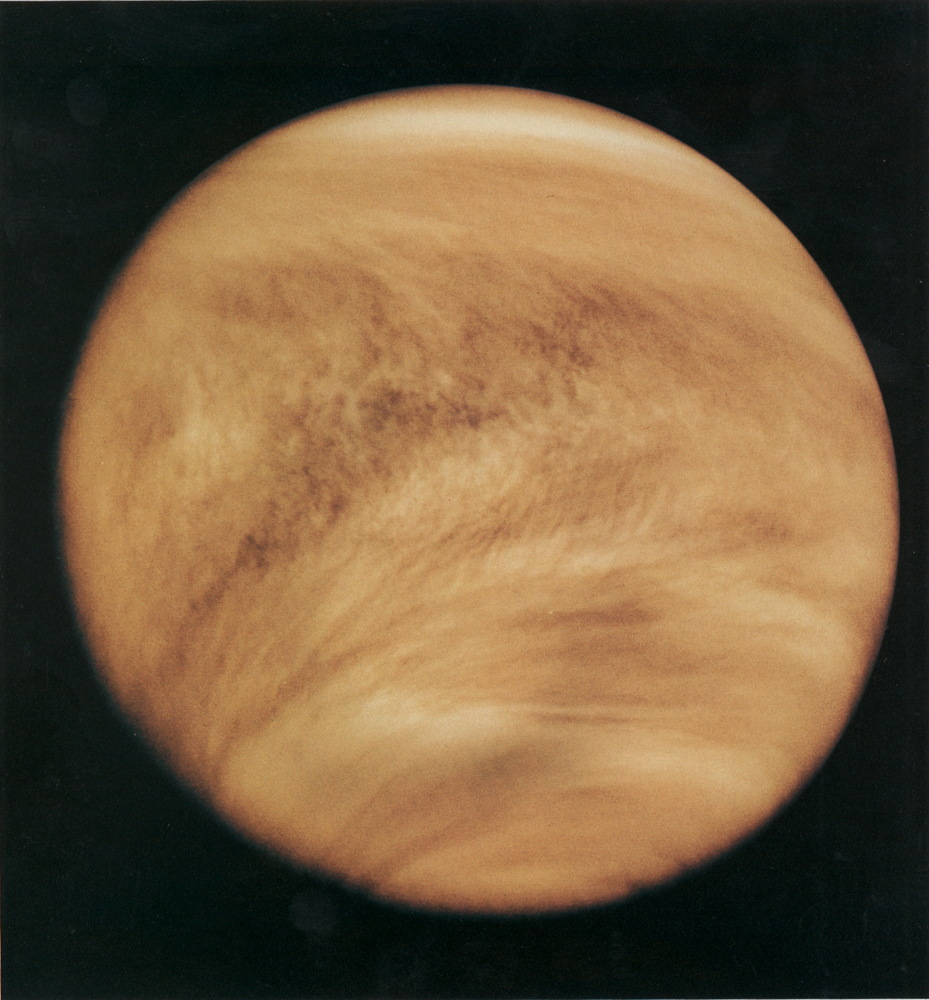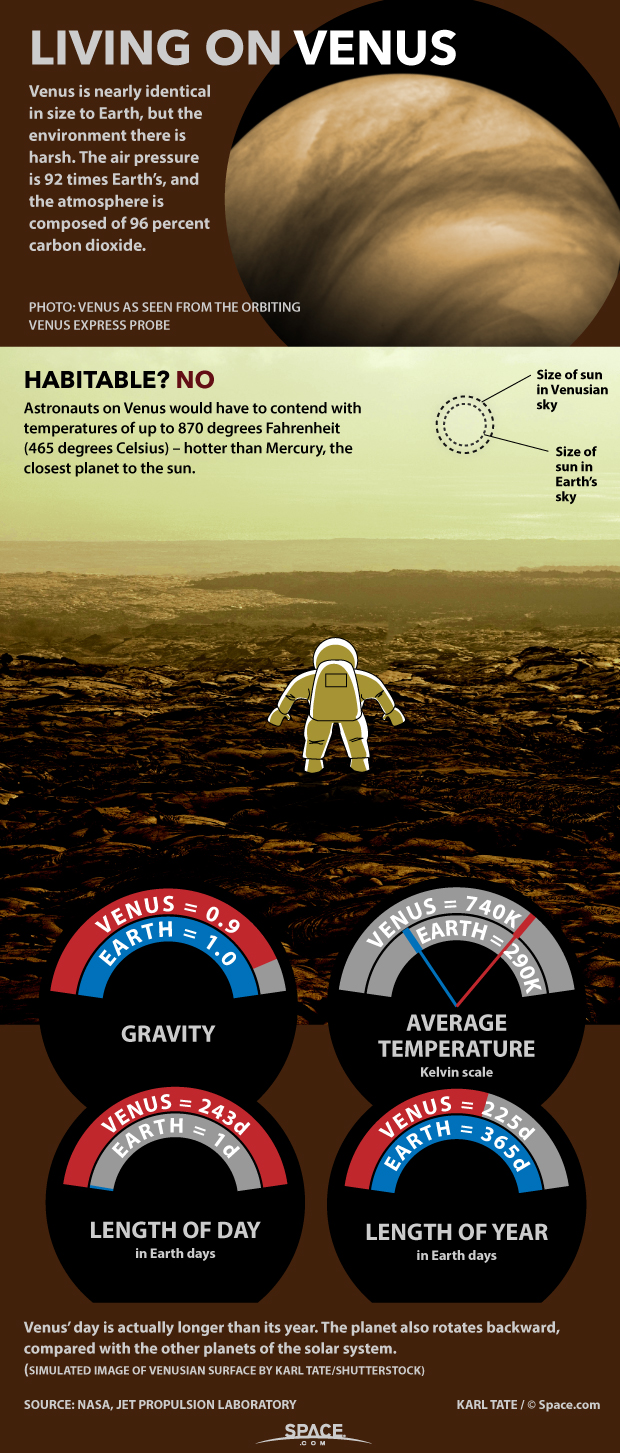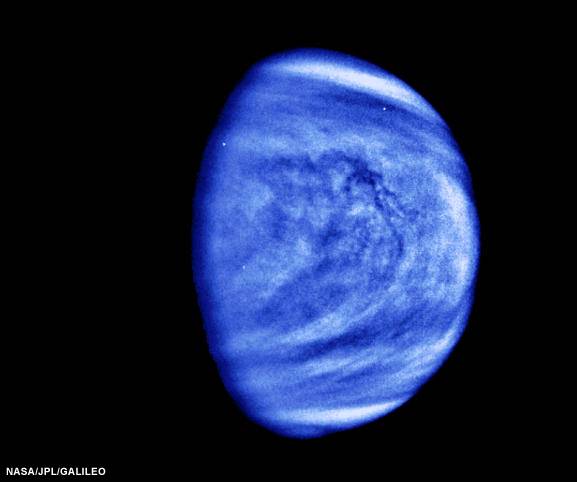What Would It Be Like to Live on Venus?

Between its desiccated, red-orange landscape and surface temperatures hot enough to melt lead, Venus is our solar system's analog to hell. Setting up a livable base on the planet is a feat far beyond our technological capabilities right now, but here's what life would be like if we could actually live on Venus.
Venus is often thought of as Earth's twin sister because the size and composition of the two planets are similar. So it should come as no surprise that NASA, the Soviet space program, the European Space Agency (ESA) and others have sent numerous spacecraft to explore the planet second closest to the sun — more than 40 in all since the 1960s. [Living on Venus: Why It Would Be Tough]
In the early 1990s, NASA's Venus orbiter spacecraft, Magellan, used radar signals to map 98 percent of the planet (we can't see Venus's surface directly because of its thick cloud cover). After that, Venus was largely forgotten about until 2005, when the ESA launched its Venus Express spacecraft to study the planet's atmosphere, said Venus Express project scientist Håkan Svedhem.
"The surface of Venus is quite different from other planets in the solar system," Svedhem told Space.com. Radar images from Magellan showed that the Venusian surface is decorated with mountains; craters; thousands of volcanoes, some of which are much larger than Earth's; lava-borne canals up to 3,000 miles (5,000 km) in length; ringlike structures called coronae, or crowns; and odd, deformed terrain called tesserae.
The planet's defining surface characteristic, however, is its flat, smooth plains, which cover about two-thirds of Venus — these plains would, arguably, be the best places to set up a home base to live.
Walking around on Venus wouldn't be a pleasant experience. The Venusian surface is completely dry because the planet suffers from a runaway greenhouse gas effect. That is, its thick atmosphere is full of heat-trapping carbon dioxide that keeps the planet's surface temperatures at about 870 degrees Fahrenheit (465 degrees Celsius).
Venus' gravity is almost 91 percent of Earth's, so you could jump a little higher and objects would feel a bit lighter on Venus, compared with Earth. "You probably wouldn't notice the difference in gravity so much, but what you would notice is the dense atmosphere," Svedhem said. "The air is so thick that if try to move your arm quickly, you would feel resistance. It would almost be like being in water."
Breaking space news, the latest updates on rocket launches, skywatching events and more!
Likewise, it'd be hard to miss the change in atmospheric pressure. At sea level on Earth, the air presses down on our bodies at 14.5 pounds per square inch, or 1 bar; the surface pressure on Venus is 92 bar. To experience that pressure on Earth, you'd have to travel more than 3,000 feet (914 m) down into the ocean. [Photos of Venus: The Planet Next Door]
Venus takes 225 Earth days to revolve around the sun and 243 Earth days to rotate on its axis. "But the time from one midday to the next is 117 Earth days, because Venus rotates backwards," Svedhem said. This retrograde rotation also means that the sun would rise in the west and set in the east.
Though we see a blue sky on Earth, the sky on Venus would always appear reddish orange because of the way the carbon dioxide molecules scatter the sun's light. You wouldn't see the sun as a distinct point in this sky, but rather a hazy, yellowish tint behind the dense clouds, Svedhem said, adding that the nighttime sky would be a starless black.
High in Venus's atmosphere, winds travel up to 249 mph (400 km/h) — faster than tornado and hurricane winds on Earth. But on the planet's surface, the wind only travels at about 2 mph (3 km/h). And though the planet does have lightning, the blinding flashes never reach the surface. Additionally, the blistering heat prevents any rainstorms from touching ground on Venus.
The active volcanoes on Venus, however, may pose a danger, Svedhem said.
And unlike Earth, Venus likely doesn't have earthquakes because it lacks tectonic plate activity that releases heat from its interior. Instead, what may happen is that the heat builds to a critical point over millions of years, and then suddenly gets released from some kind of mechanism, such as large-scale volcanic activity that remolds the surface of the planet.
But if you wanted to complain to your friends back home about how lava destroyed your backyard, don't expect an immediate response — your message would take a few minutes to reach Earth when the two planets are at their shortest distance apart. And when Venus is on the other side of the sun from Earth, it could take almost 15 minutes for your message to get home.
Editor's note: This is Part 2 in Space.com's 12-part series "Living on Other Planets: What It Would Be Like" to see what an astronaut would see on other planets and moons of our solar system and beyond. Check back every Tuesday to see how humans would live on other cosmic bodies in the universe.
Follow Joseph Castro on Twitter. Follow us @Spacedotcom, Facebook and Google+. Original article on Space.com.



